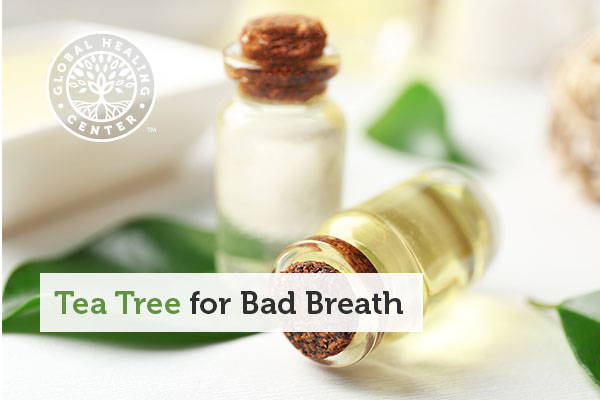
We've all experienced the horror of being in close confines with a friend or coworker who has unpleasant, bad breath. There's no mistaking the effects of that noxious pollution. The watery eyes, the gagging, the singed nasal hairs - it's a tremendously miserable experience. According to the Loma Linda University School of Dentistry, over half of all Americans have been concerned at some point in their lives that their own bad breath might be the cause of such an experience. [1]
The other half may benefit both halves by taking notice.
There are many ways to resolve the putridity that is bad breath, and if you're looking for a natural remedy, consider tea tree oil. Tea tree oil is an essential oil that's made from tea tree leaves. It's a very useful remedy for bad breath because it contains compounds that are toxic to the harmful organisms that cause bad breath.
Tea Tree for Bad Breath: The Research
The School of Nursing at Eulji University in South Korea explored the effect of a solution that contained, among a few other ingredients, tea tree oil and peppermint. Thirty two patients used the solution after which trained nurses measured their breath for bad odor, although don't ask me how. The result? Unpleasant oral odor and volatile sulphur compounds were significantly lowered after using the tea tree and peppermint solution. [2]
Tea tree oil's efficacy against bad breath has been explained by researchers at Switzerland's Institute of Preventive Dentistry and Oral Microbiology at the University of Basel. There, they evaluated tea tree oil and reported that it decreases the bacterial colonies that cause halitosis, making it beneficial for oral health. [3]
Similar conclusions were made in a five-week Brazilian study in which tea tree oil, garlic, and a chemical antiseptic solution were pitted against oral microorganisms. The tea tree oil displayed more activity against harmful oral microorganisms than garlic or the chemical solution and also rated the best for flavor. [4]
How to Use Tea Tree to Remedy Bad Breath
Tea tree can be very effective at reducing bad breath and the easiest ways to add it to your oral hygiene routine include:
- Using a toothpaste that contains tea tree.
- Adding a few drops of tea tree oil to your regular toothpaste once it's on your toothbrush.
- Use an oral cleansing product that contains tea tree.
It needs to be mentioned that if you're totally ignoring your oral health, a few drops of tea tree oil isn't going to make everything dandy. Practicing complete, proper oral hygiene by brushing your teeth and tongue at least twice a day is a must, as is daily flossing. Since bad breath can, largely, be the product of an unclean mouth, a comprehensive approach to cleaning your mouth is what you need to shoot for to help alleviate the situation. Tea tree is another useful tool to add to your regimen.
References (4)
- Lee SS, Zhang W, Li Y. "Halitosis update: a review of causes, diagnoses, and treatments." J Calif Dent Assoc. 2007 Apr;35(4):258-60, 262, 264-8.
- Hur MH, Park J, Maddock-Jennings W, Kim DO, Lee MS. "Reduction of mouth malodour and volatile sulphur compounds in intensive care patients using an essential oil mouthwash." Phytother Res. 2007 Jul;21(7):641-3.
- Forrer M, Kulik EM, Filippi A, Waltimo T. "The antimicrobial activity of alpha-bisabolol and tea tree oil against Solobacterium moorei, a Gram-positive bacterium associated with halitosis." Arch Oral Biol. 2013 Jan;58(1):10-6. doi: 10.1016/j.archoralbio.2012.08.001. Epub 2012 Aug 29.
- Groppo FC, Ramacciato JC, Simões RP, Flório FM, Sartoratto A. "Antimicrobial activity of garlic, tea tree oil, and chlorhexidine against oral microorganisms." Int Dent J. 2002 Dec;52(6):433-7.
†Results may vary. Information and statements made are for education purposes and are not intended to replace the advice of your doctor. If you have a severe medical condition or health concern, see your physician.







